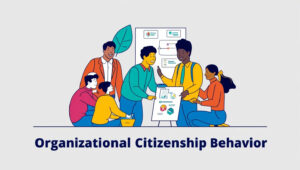Job performance encapsulates a set of behaviors employees can exhibit in the workplace. These behaviors impact organizational goals and can have positive or negative connotations. Job performance is a multidimensional concept that includes:
- Task performance
- Organizational citizenship behavior (OCB)
- Counterproductive work behaviors (CWB).
Understanding how these behaviors interact and the role of cognitive ability in predicting them can provide valuable insights for hiring, performance evaluations, and workplace culture.
Task performance
Task performance measures how effectively an individual carries out the essential duties of their job role. It includes the effectiveness, efficiency, and quality of completing specific tasks outlined in one’s job description. Task performance evaluations typically focus on accuracy, the correctness and precision of task execution, timeliness, how quickly tasks meet deadlines, proficiency, the skill level and competence displayed, and consistency, indicating the reliability and regularity of achieving satisfactory results over time (Griffin et al., 2007).
Organizational Citizenship Behavior (OCB)
 OCB refers to voluntary actions that enhance an organization’s effectiveness, even though they are not formally recognized or included in job descriptions. Positive affect and job satisfaction are significant predictors of OCB (Ilies et al., 2006). Managers can rely on employees who engage in OCB because they are the individuals who go the extra mile and are willing to assist their colleagues despite the lackof official recognition or rewards for their additional efforts. Research consistently indicates that OCB fosters positive employee relationships, enhances cooperation, and leads to a more cohesive work environment. It contributes to smooth organizational functioning by ensuring employees voluntarily support one another and the organization, even without direct rewards. This behavior is often associated with employee satisfaction and commitment, helping to cultivate a positive organizational culture (Park et al., 2022). Empathy, extraversion, social responsibility, age, and emotional state can influence prosocial behavior. Contextual elements like norms of reciprocity, group cohesion, role models, leadership style, organizational climate, and involvement in decision-making also impact OCB.
OCB refers to voluntary actions that enhance an organization’s effectiveness, even though they are not formally recognized or included in job descriptions. Positive affect and job satisfaction are significant predictors of OCB (Ilies et al., 2006). Managers can rely on employees who engage in OCB because they are the individuals who go the extra mile and are willing to assist their colleagues despite the lackof official recognition or rewards for their additional efforts. Research consistently indicates that OCB fosters positive employee relationships, enhances cooperation, and leads to a more cohesive work environment. It contributes to smooth organizational functioning by ensuring employees voluntarily support one another and the organization, even without direct rewards. This behavior is often associated with employee satisfaction and commitment, helping to cultivate a positive organizational culture (Park et al., 2022). Empathy, extraversion, social responsibility, age, and emotional state can influence prosocial behavior. Contextual elements like norms of reciprocity, group cohesion, role models, leadership style, organizational climate, and involvement in decision-making also impact OCB.
Counterproductive Work Behavior (CWB)
Counterproductive behaviors are actions employees take that obstruct organizational goals and negatively impact the work environment. They diminish productivity, lower morale, and disrupt overall operations. Examples include absenteeism, or unjustified absence, which places a burden on coworkers; presenteeism, where an employee is physically present at work but not fully engaged due to stress or illness; workplace incivility, which encompasses rude behavior towards colleagues; theft of company property; gossiping, which undermines relationships; and the avoidance of responsibilities by neglecting tasks. Organizational Citizenship Behavior (OCB) and task performance are positive organizational behaviors, whereas counterproductive behaviors are detrimental.
Does Cognitive Ability Predict OCB?
Scholars have traditionally established a positive relationship between general cognitive ability (GCA) and job performance. However, caution should be exercised when considering GCA as the primary predictor of job performance. Overall performance measures that include task performance, citizenship, and counterproductive work behavior will reduce the correlation with cognitive ability (Sackett et al., 2023). Although task performance and organizational citizenship behavior (OCB) are crucial for overall organizational effectiveness, they differ in their cognitive demands.
Task performance often requires technical skills and problem-solving abilities closely tied to cognitive ability. OCB relates more to affective and motivational factors, including job satisfaction, organizational commitment, and interpersonal relationships, and does not directly connect to cognitive ability. Cognitive ability is mainly associated with task performance in roles that require high cognitive demands. This association arises because task performance typically involves a more significant cognitive load, necessitating problem-solving, analytical thinking, and technical proficiency (Sackett et al., 2023). In contrast, OCB encompasses behaviors such as helping others or showing courtesy, which are likely less dependent on cognitive ability and more influenced by personality traits like conscientiousness and agreeableness, as well as motivational factors. While task performance relies heavily on cognitive ability, OCB is shaped more by interpersonal and motivational factors.
Both task performance and organizational citizenship behavior contribute to organizational success, but they do so in distinct ways. While cognitive ability is a critical predictor of technical performance, a flourishing workplace culture relies on employees who willingly go above and beyond.








